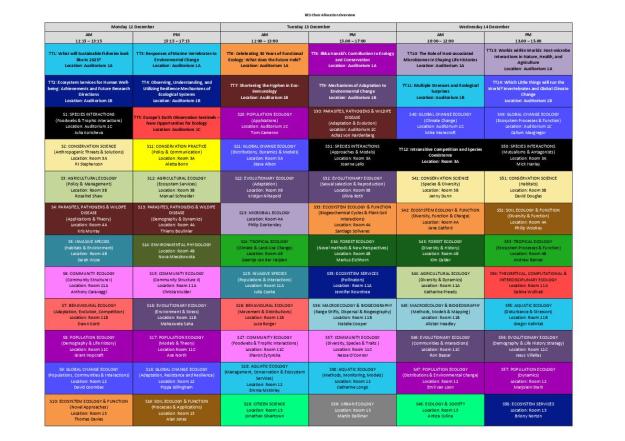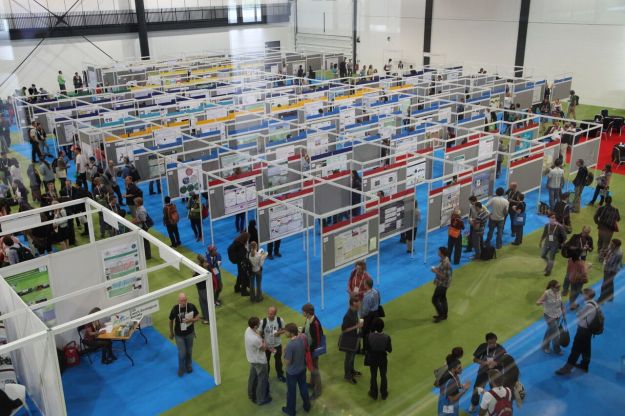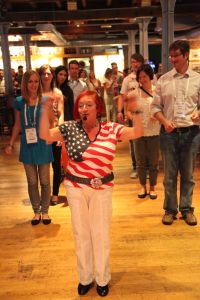I’ve attended pretty much every BES since 1999, during which time the meeting has massively increased in size; we now attract over a thousand delegates, making it the largest gathering of ecologists in Europe. There has also been an overall increase in quality of presentations, accompanied by stiff competition for slots. With so many people and so much awesome science to see*, it can be easy to feel overwhelmed.
This post is aimed at people attending the BES for the first time, and gives some suggestions for how to get the most out of it. If you’re a student then some of these tips will be especially helpful. Older hands can check whether they agree and add their own thoughts in the comments.

A stranger is just a collaborator you haven’t met yet. Or more likely a reviewer that you already hate, but only they know it.**
- Pick a session and stick with it. With 12 parallel sessions, you’re not going to be able to see everything. Or even most of it. One way to guarantee missing even more is to run between sessions to catch particular talks. With the best will (and chairs) in the world, sessions do not run exactly to time, and getting between them often takes longer than you think. The end result is that you have to dash out as soon as one speaker finishes (disrupting the questions in the process), run to another lecture theatre, then miss the start of the next one. Often you’ll end up stood at the back, crammed on the end of a row, or waiting in the corridor. A better strategy is to choose the session that sounds most fun, pick a good seat, then just embrace whatever comes along. Take a gamble and discover something new rather than listen to work you’ve already heard about.

Ooo, colourful! Pick one you like then just sit through the whole thing. The dark green is particularly recommended.
- No-one has read your abstract. Back in August you had a tentative idea about what your results might show, once you’d finished collecting and analysing the data. By the time you put everything together for the meeting, the conclusion has probably entirely changed. This is not a problem, because no-one will notice. The title you gave was indicative of the content. Treat your talk as a fresh start. No-one is assessing how closely your actual talk or poster follows the abstract in the meeting program.
- Posters can be skimmed. Good posters, that is. Even yours. Don’t try and read every one and absorb the information (unless you’re marking them), because your brain will be full after the first five. Better to find one with an interesting title or concept, then ask the person presenting it to talk you through. Conversations about posters are always more rewarding than standing in silence while the author nervously watches you. If they’re not there then find them later or send a message.

You’re not going to read all those posters unless you’re really trying to avoid social interaction.
- E-mail the people you want to meet. If you have a hit-list of people to whom you really want to show off your research, send them a quick message beforehand. Best of all is to say “I’m giving a talk on helicopter weevils in the east stairwell on Thursday at 8:30pm and I’d really appreciate if you could make it.” Most will be flattered and make an effort to come along, thereby finding out who you are so they can recognise you later. It also helps to prompt conversation. If you don’t do this then expect to spend the whole meeting in a futile effort to spot the right name on the tags worn by total strangers. And failing.
- Having said that, it’s even more important to make contacts in your own peer group. Meeting the stars of your field is often invigorating, but if you’re a PhD student then others like you are the people who, in future, you’ll be collaborating with and seeing at the next conference. I would argue that these are the most important connections you can make — in time they will become your friends. Try not to hang around with people from your own institution too much, you’ll see them again next week anyway. If you’re already an established ecologist then make an effort to talk to younger people, and if they’re on their own, to introduce them to others.

This is the BRITISH Ecological Society. We do not slavishly follow the Americans and their ways.
- Go to the Specialist Interest Group meetings. They’re the best way to meet like-minded ecologists, and also a great way to get more involved with the society. It’s not well-known enough that the SIGs have access to money, and are always looking for ideas from members for events that they could run. Tell them what you would like the society to put on, and best of all, offer to run an event yourself!
- Find a conference buddy. The ideal person will be at the same career stage, from a different place, working in a related but slightly different field, and who you’ve only just met. Arrange to catch up regularly, perhaps at breakfast to compare what sessions you’re going to, or at coffee time to swap notes. This doubles your potential to find out about interesting people and science, because they can look out for things on your behalf. The welcome mixer on the first evening is a good place to recruit one. Also, when you go down for breakfast wherever you’re staying, look out for the tell-tale tags and bags of fellow delegates and approach anyone who looks like they’re alone.
- Steal stuff. Not valuable infrastructure. But all the stalls will be giving away a wide variety of useful things: pens, USB sticks, post-it notes, mugs, fridge magnets… Harvest them. I haven’t needed to buy a pen in years. They’re often desperate to get rid of this stuff because it means they don’t have to carry it all the way back home. My family always know what to expect for Christmas. “An Oxford University Press beermat? You’re too kind!”

Quick, no-one’s looking after the stand, STEAL ALL THE PENS.
- Watch out for the drinking. There’s no getting round it, British people do like to drink, more than most nationalities. Add to this the lethal combination of it being right before Christmas, at the end of a draining academic semester, and it’s inevitable that we flood to the bars. Most of the evening social events involve alcohol. If you’re a non-drinker then don’t worry, you won’t be a pariah, just be aware that others will be drinking around you. My main warning is to the drinkers though. It’s easy to slip into a cycle of filling up on booze in the evening, staying out late, hardly sleeping, then sustaining yourself on endless cups of coffee throughout the day. This is not healthy. It’s ok to sometimes drink something that doesn’t contain alcohol or caffeine.*** Really, the water is completely safe.
- Talk to people! One of the best things about BES, and which we work hard to encourage, is that it’s welcoming and informal. That’s also a British thing; we’re not good at massaging big egos, or letting people take themselves too seriously. This means that if there is someone who has been particularly influential or inspirational for you, or whose advice you’d like, just walk up and say hello. Seriously. Even the plenary speakers will be glad to speak to an enthusiastic student. If you’re not sure then ask me to introduce you.
On which note, if you’re stuck for someone to talk to, and you happen to spot me, please come up and say hello! I don’t care whether you’re a keen undergraduate or an embittered old prof, whether you work on foraminifera or velvet worms. I’m always happy to meet new people, and, if I can, to introduce you to lots of other cool ecologists. The one place you’re guaranteed to find me is the Forest Ecology Group mixer. We know how to party.
I love the BES. Forget Christmas, this really is the most wonderful time of the year.
* Although apparently one person only used to come for the meat sandwiches. Each to their own I suppose.
** Thanks to Richard English for the photos, which are all from the amazing BES centenary meeting with INTECOL in 2013. I was there, but too preoccupied to take any pictures.
*** I don’t follow my own advice. You’ll find me a pale, trembling wreck by the last morning, and it takes a few days to recover. No loud noises or rapid movements please.

It wasn’t just the meat sandwiches that I came for 🙂 The science is awesome too, I would love to be able to join you this year, but I am teaching that week – our term doesn’t finish until the 16th December 🙂
LikeLike
I’d love the idea of finding a member of my peer group, but I expect the ’50-somethings-who-went-back-to-university-to-do-a-PhD-in-a-moment-of-madness’ group may be a bit limited! Still, I might turn out for the 6am fun run.
But, as a cheap plug, my talk on DNA barcoding pollen from hoverflies on Monday at 12:45 in ecosystem ecology and function will be a rollercoaster of a ride!
LikeLike
You might be surprised! The main problem is a lack of self-identification. Maybe we could run a conference buddy match-making service?
LikeLike
Pingback: #BES2016 Quantitative Ecology SIG events | BES Quantitative Ecology Blog
Those conference photos look an awful lot like the London Intecol meeting… 😉
I’d add: Accommodation, stay close to the venue if you can unless you are sure there is a good metro service, you will probably be socialising by night and having a long trek back to the venue can make you decide to leave earlier than you’d like…..or get lost on the way
LikeLiked by 1 person
Good advice! It’s tempting to take a cheaper hotel out in the boon-docks, but then you end up spending half your time getting to and from the venue, or missing events. It’s also nice to be able to escape from the meeting if you need to decompress.
LikeLike
yes, or if you either leave something behind, or want to go out with other attendees in the evening without carrying your laptop, etc: staying close is always a better bet!
LikeLike
Pingback: Looking forward to #BES2018: Julia Koricheva – Functional Ecologists – A blog for the people behind the research